 |
 |
 |
 |
 |
 |
| |
 |
|
 |
 |
 |
  |
  |
 |
 |
 |
 |
|
|
 |
|
 |
 |
 |
OPERA |
 |
|
 |
|
 |
 |
 |
| |
 |
| 
 |
SUTD - The Singapore University of Technology and Design
|
|
 |
 |
 |
 |
PROGETTISTA |
 |
|
|
 |
|
 |
 |
 |
| |
 |
|
 |
 |
 |
 |
DESCRIZIONE |
 |
|
|
 |
|
 |
 |
 |
| SUTD - a collaborative social fabric |
 |
|
 |
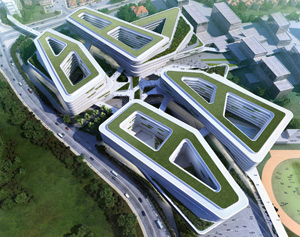 The new academic campus for the SUTD is located on a site of approx. 83,000 m2 and is close to both Changi airport - Singapore’s principal airport - and the Changi Business Park. The SUTD is Singapore’s fourth public university. The new academic campus for the SUTD is located on a site of approx. 83,000 m2 and is close to both Changi airport - Singapore’s principal airport - and the Changi Business Park. The SUTD is Singapore’s fourth public university.
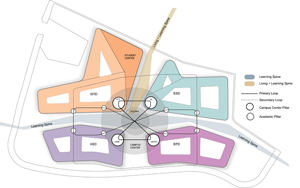 The Singapore University of Technology and Design offers four key academic pillars: Architecture and Sustainable Design (ASD), Engineering Product Development (EPD), Engineering Systems and Design (ESD) and Information Systems Technology and Design (ISTD). The SUTD is a driver of technological innovation and economic growth, with the new academic campus acting as both a catalyst and a conveyor for advancement by bringing together people, ideas and innovation. The Singapore University of Technology and Design offers four key academic pillars: Architecture and Sustainable Design (ASD), Engineering Product Development (EPD), Engineering Systems and Design (ESD) and Information Systems Technology and Design (ISTD). The SUTD is a driver of technological innovation and economic growth, with the new academic campus acting as both a catalyst and a conveyor for advancement by bringing together people, ideas and innovation.
Through collaboration with the Massachusetts Institute of Technology (MIT) and a further partnership with Zhejiang University, the SUTD combines the best practices and values of the East and the West. |
|
 |
 |
 |
|
 |
|
| Celebrating teaching and learning |
 |
|
 |
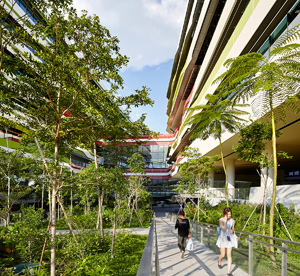 The new academic campus directly reflects SUTD’s curriculum, using the creative enterprise of the school to facilitate a cross-disciplinary interface: interaction is established between the professional world, the campus, and the community at large. The design for the academic campus offers an opportunity to embrace innovation and creativity through a non-linear connective relationship between students, faculty, professionals and the spaces they interact with. The new academic campus directly reflects SUTD’s curriculum, using the creative enterprise of the school to facilitate a cross-disciplinary interface: interaction is established between the professional world, the campus, and the community at large. The design for the academic campus offers an opportunity to embrace innovation and creativity through a non-linear connective relationship between students, faculty, professionals and the spaces they interact with.
 Ben van Berkel: “The design for the SUTD consciously avoids over-articulation and instead focusses on infrastructural qualities, on connectivity and the creation of an open, transparent and light facility that responds to the requirements of the contemporary campus. In this way the architecture of the SUTD does not attempt to overwhelm the students with a singular vision, it instead enables them to develop their own architectural language for the future.” Ben van Berkel: “The design for the SUTD consciously avoids over-articulation and instead focusses on infrastructural qualities, on connectivity and the creation of an open, transparent and light facility that responds to the requirements of the contemporary campus. In this way the architecture of the SUTD does not attempt to overwhelm the students with a singular vision, it instead enables them to develop their own architectural language for the future.” |
|
 |
 |
 |
|
 |
|
| Sustainable learning |
 |
|
 |
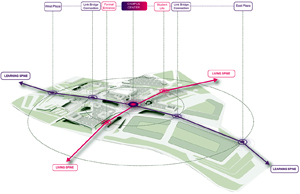 The new SUTD academic campus will facilitate cross-disciplinary interaction among all four pillars of academia which is interlaced with the Humanities, Arts and Social Science curriculum and research. Following the master plan, the academic campus is designed through two main axes: the living and learning spines, which overlap to create a central point and bind together all corners of the campus. The new SUTD academic campus will facilitate cross-disciplinary interaction among all four pillars of academia which is interlaced with the Humanities, Arts and Social Science curriculum and research. Following the master plan, the academic campus is designed through two main axes: the living and learning spines, which overlap to create a central point and bind together all corners of the campus.
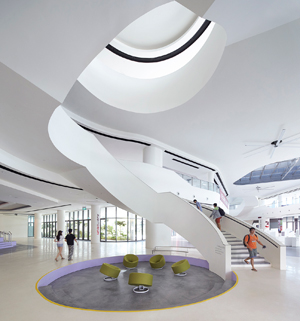 UNStudio proposed a flexible space for exhibitions, events and interaction at the central node: this Campus Centre forms the intellectual heart of the campus and directly links the main programmatic anchors of the Auditorium, the International Design Centre and the University Library. UNStudio proposed a flexible space for exhibitions, events and interaction at the central node: this Campus Centre forms the intellectual heart of the campus and directly links the main programmatic anchors of the Auditorium, the International Design Centre and the University Library.
The spatial configuration of the academic campus generates a seamless network of education, a 24/7 campus which enhances direct interaction through both proximity and transparency.
Ben van Berkel: “From the exterior the SUTD academic buildings look like somewhat dense, separate blocks, but they are in fact experienced in a completely connected and open way. By introducing diagonal and framed view corridors, vertical and horizontal connections and covered walkways and by tapering the elevations of the buildings, openness is created that means the buildings are experienced as a connected whole. Traditional divisions between rooms and corridors are also dissolved, resulting in flexible spaces and encouraging movement throughout the buildings.” |
|
 |
 |
 |
|
 |
|
| . |
 |
|
 |
|
 |
 |
 |
 |
 |
 |
 |
VIDEO |
 |
|
|
 |
|
 |
 |
 |
| |
 |
|
 |
 |
 |
 |
ECOSOSTENIBILITA' |
 |
|
|
 |
|
 |
 |
 |
|
|
 |
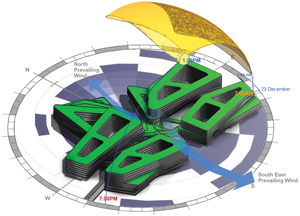 The SUTD is a highly sustainable building, incorporating numerous passive design strategies designed to counteract the conditions caused by Singapore’s tropical climate. Based on extensive orientation and wind studies natural ventilation principles are applied throughout the design, alongside cooling techniques, covered walkways, louvred facade shading, open voids, extensive daylight to the interiors and protection from heavy rain showers. The SUTD is a highly sustainable building, incorporating numerous passive design strategies designed to counteract the conditions caused by Singapore’s tropical climate. Based on extensive orientation and wind studies natural ventilation principles are applied throughout the design, alongside cooling techniques, covered walkways, louvred facade shading, open voids, extensive daylight to the interiors and protection from heavy rain showers.
 The overall design forms a response to the natural landscape of Singapore, both through colour application and through the incorporation of facade planters, green roof terraces and sky gardens and numerous green pockets planted with native trees and flowering plants. The overall design forms a response to the natural landscape of Singapore, both through colour application and through the incorporation of facade planters, green roof terraces and sky gardens and numerous green pockets planted with native trees and flowering plants. |
|
 |
 |
 |
 |
 |
 |
 |
LOCALIZZAZIONE |
 |
|
|
 |
|
 |
 |
 |

|
 |

|
Continente |
|
 |
  Asia |
|
Nazione |
|
 |
  Singapore |
|
Città |
|
 |
  Singapore |
|
Indirizzo |
|
 |
  8 Somapah Road
|
|
|
|
 |
|
Sito web |
|
 |
|
 |
 |
 |
 |
MAPPA |
 |
|
|
 |
|
 |
 |
 |
| |
 |
|
 |
 |
 |
 |
|
TIPOLOGIA |
 |
|
|
 |
|
 |
 |
 |
|
|
 |
ARCHITETTURA | Edifici per l'insegnamento
Università, colleges
|
URBANISTICA E PROGETTAZIONE URBANA | Nuovi insediamenti
Campus universitario
Progettazione urbana e rinnovo urbano
Aree e centri scolastici e universitari
| |
 |
 |
 |
 |
CRONOLOGIA |
 |
|
|
 |
|
 |
 |
 |
Progetto |
 |
|
 |
| 
 |
2010
progetto vincitore di concorso ad invito
|
|
Realizzazione |
 |
|
 |
| 
 |
2011 - 2015 |
|
 |
 |
 |
 |
AGGIUNTE E DIGRESSIONI |
 |
|
|
 |
|
 |
 |
 |
| |
 |
| UNSTUDIO WORK FIELD |
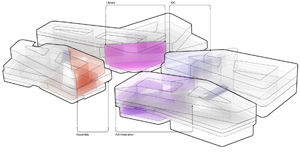 New Campus- collaborative social fabric shaped by an activating, adaptive, transparent and connective environment New Campus- collaborative social fabric shaped by an activating, adaptive, transparent and connective environment
UNStudio’s recently established New Campus work field responds to expanding definitions of what constitutes a campus today. The changing requirements of both learning institutions and the workplace play a large role in the design of the New Campus. Clustering and separation are replaced by cross-disciplinary and flexible organisations, as well as infrastructural connections that organise the buildings both physically in relation to one another and by way of view lines and visual connections. The New Campus is designed to encourage connectivity, collaboration, co-creation, innovation and sociality. The design for the academic campus of the recently completed Singapore University of Technology and Design exemplifies this approach. |
|
|
| |
|
|
 |
 |
 |
 |
 |
 |
 |
COMMITTENTE |
 |
|
|
 |
|
 |
 |
 |
| |
 |
| The Singapore University of Technology and Design |
|
 |
 |
 |
 |
DATI
DIMENSIONALI |
 |
|
|
 |
|
 |
 |
 |
| Superficie |
 |
|
 |
lotto mq. 76.846
totale mq. 213.000
I fase mq. 88.000
II fase mq. 125.000 |
|
| Volumetria |
 |
|
 |
totale mc. 1.022.400
I fase mc. 422.400
II fase mc. 600.000 |
|
 |
 |
 |
 |
STRUTTURISTA |
 |
|
|
 |
|
 |
 |
 |
| |
 |
|
 |
 |
 |
 |
STAFF |
 |
|
|
 |
|
 |
 |
 |
Coprogettisti  |
 |
|
|
 |
|
Gruppo di progettazione |
 |
UNStudio
Ben van Berkel, Caroline Bos, Astrid Piber
Christian Veddeler, Jordan Trachtenberg
Ren Horng Yee, Adi Utama, Jeff Johnson, Melissa Lui
DP Architects
Chan Sui Him, Teoh Hai Pin, Jeremy Tan, Seah Chee Huang, Wykeith Ng, Liew Kok Fong, Wang Ying, Yeong Weng Fai, Jaye Tan. |
|
Controllo costi |
 |
| KPK Quantity Surveyors (Singapore) Pte Ltd |
|
 |
 |
 |
 |
ANNOTAZIONI |
 |
|
|
 |
|
 |
 |
 |
| |
 |
Phasing
The SUTD project is divided into phases: phase 1 - which is now complete - incorporates buildings 1 and 2 and parts of buildings 5 and 3. |
|
 |
 |
 |
 |
CREDITS |
 |
|
|
 |
|
 |
 |
 |
| |
 |
Photos © Hufton+Crow
Drawings © UNStudio
Text edited by UNStudio
Courtesy of UNStudio
|
|
 |
  |
 |
|
|